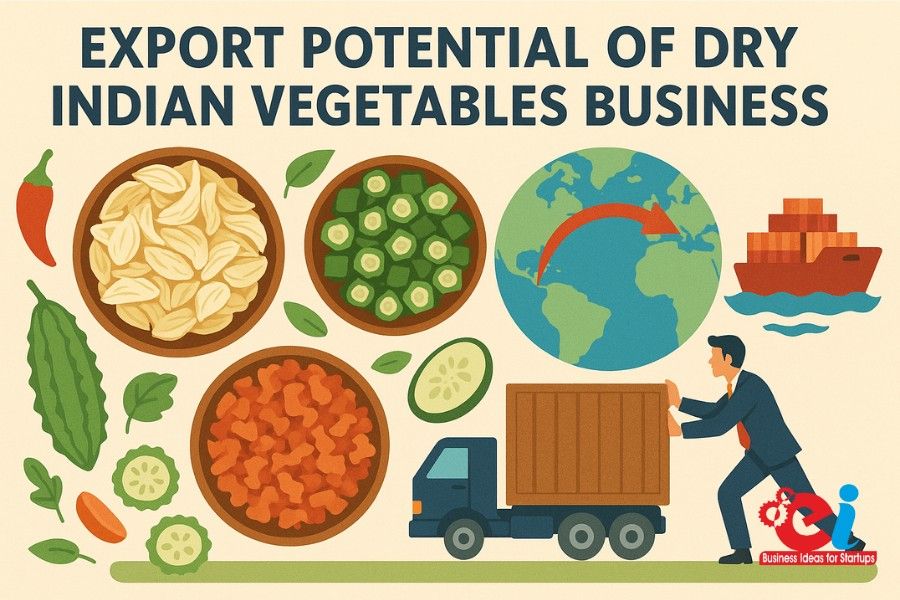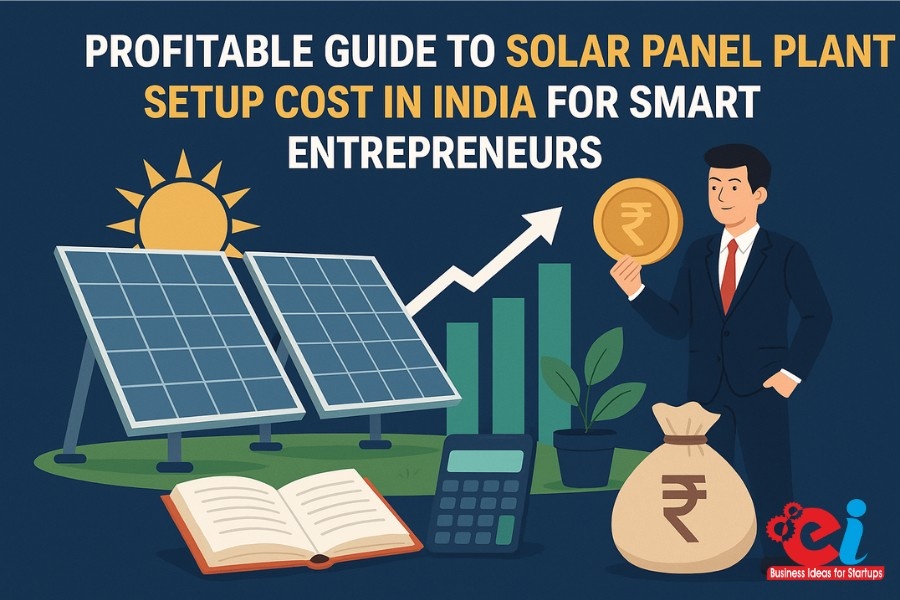Having been one of the primary producers of vegetables in the world, India holds leading position in agri-exports. The emerging global markets have seen an increase in dried vegetables due to convenience, long shelf-life, and health-focused options. Extended agro-climatic boundaries and abundant cost-efficient labor make India’s agricultural output competitive under this new segment.The purpose of this report is to examine the prospects available in the Dry Indian Vegetables market and provide actionable guidance to business leaders regarding market volume, international patterns, export plans, regulatory benchmarks, and strategic investments. It also explains how NPCS enables the growing market of dried vegetable processing by providing reliable project reports that allow industry newcomers to gain market-ready and globally competitive business models.
1. International Market Ranges – How Buying and Demand Resolve Shelf Life
Scholars used to 2022 estimate the global market of Dry Indian Vegetables to be approximately 38 billion which is likely to increase up to 56 billion in 2030. An increase is guaranteed. Subsequently, the Forecast in CARG will consequently expand by 5.8% In international markets the following factors typically contribute to growth:
- A surge in demand for Ready to Cook (RTC) and Ready to Eat (RTE) meals
- Emergence of Vegan and Plant Based diets
- Increase in Military, Aerial and Emergency Food Supplies
- Favorable changes in the Exports Supply Chain
Importing Regions Focused On:
- North America: The USA followed by Canada is the main player because of the growing health consciousness which promotes the usage of processed and Pre prepared food.
- Europe: Germany, France, UK & Netherlands focus on Clean Boy and Organic Dried Vegetables.
- Middle East & Africa: Extremely high reliance on imports due to lack of cultivable land is available.
- Asia Pacific: Including Japan, South Korea and ASEAN member countries for convenience foods, seasonings and noodles.
2. A Reason Why India Is Bound to Lead the Charge in the Global Market for Dry Indian Vegetables and Dried Vegetable Exports
A. Advantageous Agro Climatic Zones
The complex combination of Indian Climatic zones permits all year round availability of crops that can be dried. The Supply base dependably encompasses a large number of constituents including the onions from Gujarat, Tomatoes from Tamilnadu and garlic from UP.
B. Affordable Prices
Lower Indian wages are the result of the following factors:
- Purchasing inputs from agriculture is cheap.
- Indian skilled and semi-skilled labor wages are cheap.
- Smallholder farming is well established.
C. National Government Aid
Important support initiatives for export activities include:
- APEDA (Agricultural and Processed Food Products Export Development Authority) offers financial and promotional assistance.
- Small and Medium-sized Enterprises (MSME) Subsidies and PMFME Scheme helps set up food processing units.
- Operation Greens and the Agri-Infrastructure Fund provide various loans, and grants to fund infrastructure.
D. Organic and Sustainable Farming
India’s growth in certified organic farming enables the country to export residue-free and traceable dried vegetables to the European Union, the United States of America, and Canada
Related: Export Potential of Dry Indian Vegetables Business
3. Demand for Dehydrated Vegetables
The following Dry Indian Vegetables are extensively exported in dried, powdered or flaked form:
| Vegetable | Popular Forms | Key Markets |
| Onion | Flakes, minced, powder | USA, UK, Germany, UAE |
| Garlic | Flakes, granules, powder | Japan, Canada, Australia |
| Spinach & fenugreek | Whole dried, powder | Middle East, Europe |
| Tomato | Slices, powder | Southeast Asia, Europe |
| Ginger | Dried slices, powder | China, USA, Netherlands |
| Okra, Bitter gourd, Carrot | Cubes, Slices | UAE, Africa, Gulf |
These products are widely used by:
- Instant food manufacturers
- Frozen food companies
- Catering and HoReCa segments
- Nutraceutical and health supplement brands
4. Process Techniques & Quality Control
A. Dehydration methods
- Drying in the Sun: Cheaper and more sustainable option, ideal for small-scale producers
- Hot Air Tray Drying: Most popular method; best combination of cost and quality
- Freeze Drying: Best in retaining nutrition and used for premium exports
- Microwave and Vacuum Drying: New methods that use modern technology for better preservation
B. Quality Certifications Required
- FSSAI (India)
- ISO 22000 / HACCP
- BRC (British Retail Consortium) for EU markets
- USFDA (North America exports)
- Organic certification (NPOP, USDA, EU organic)
C. Packaging standards
- Moisture-proof vacuum sealed pouches
- Nitrogen flushing to retain it’s freshness
- Tamper-proof with country of origin, expiration and make details
5. Export Procedure: In Steps
Business registration and licenses
- FSSAI licence
- Import Export code (IEC)
- GST Number
Setting Up the Infrastructure:
This covers the following systems:
- Unit’s cold bagging and sorting area
- Unit’s Research and Development
- Soft shelf life tests, texture, moisture retention, and shelf life testing
Quality evaluation:
- Contaminant testing, clean air lab tests, microbial load assessment, pesticide residue analysis, residues, and more
Export logistics:
- Partnerships with aggregators to connect with reach forwarders and clearing agents, specialized freighters private sub-fleet
- Temperature Controlled Shipping Containers for Perishables
Related: Vegetable Processing Industry
6. Financial Overview: Expected Investments and Returns
Case Study: Mid-Scale Unit (20 000 kg/day)
- Land & Facility: ₹40-50 lakhs
- Equipment & Machinery: ₹₨70 90 lakhs
- Working capital (6 months): 50 crores
- Approximate project outlay: Estimate to 1.6 – 2 Crore
- Turning over/exported: 4.5 – 6 crore Estimated
- Export packaging: P140-400 Per KG; growth envelope: 20 – 25%
- Expected initial losses: 2.5<overhead:3 years
7. Support NPCS Offers NIIR Project Consultancy Services
NIIR Project Consultancy Services (NPCS) has exceptional experience in creating professional, bankable project plans including but not limited to pre-investment analyses and feasibility studies of dried vegetable processing and export-focused food processing plants.
NPCS Services Include:
- Tailored DPRs for all types of business units, be it small, medium, or large
- Business Export Trends Research and Analysis
- Risk and SWOT Analysis
- Flowcharts for Plant Layouts and Processes
- Guidance on Selecting Machinery
- Strategy for Acquiring Raw Materials
- Projections of ROI and Financial Planning Models
- Advice on Compliance of Company Regulations
Examples of NPCS Projects:
- Manufacturing of Garlic and Onion Powder
- Production of Flaked Vegetables and Tomato Powder
- Units for Drying Green Leafy Vegetables
- Dehydration Plants for Organic Vegetables
8. Challenge and Mitigating Strategy
| Challenge | Mitigation Approach |
| Supply that is seasonal | Farming contracts, storing in the cold chain |
| Inconsistency in Quality | QA labs plus all other certifying bodies will need to be invested in |
| Delays in exports | Partnerships with freight companies and buffer stocks |
| Lack of Funding | Subsidies from MSMEs alongside term loans help |
| Changing Prices | Market diversifying, along with forward contracts to buyers |
9. Exports and Emerging Trends & Future Developments
- Private Labeling Surge: Demand from international retail chains for white-labeled Dry Indian Vegetables sourced from Indian suppliers
- Rising need for compostable or biodegradable export packaging
- Exporting via Amazon Global, Alibaba, and TradeIndia for both B2B and B2C
- The use of blockchain technology in agriculture supply chains for monitoring transparency from farm to fork
10. Conclusion: India’s Competitive Advantage with Potential Value Added Vegetable Export Opportunities
There are opportunities for Indian agribusinesses in the form of scalable exports with high-margins, as the demand for Dry Indian Vegetables is rising worldwide across various demographics. With the right technology integration, quality assurance, international marketing, and other necessary factors, Indian producers are able to establish sustainable commercial relationships across the globe.
Through collaboration with NIIR Project Consultancy Services, they offer comprehensive support starting from brainstorming and project viability checking to execution and scaling, thus aiding the entrepreneurs. NPCS’s experience combined with India’s agricultural backbone makes this the ideal time to invest in the dried vegetables export market.
Contact Details: NIIR Project Consultancy Services
📞 Phone: +91-9097075054
📧 Email: npcs.ei@gmail.com | info@entrepreneurindia.co
NIIR Project Consultancy Services — Your partner of choice for agri industrial project exports and investments.

















